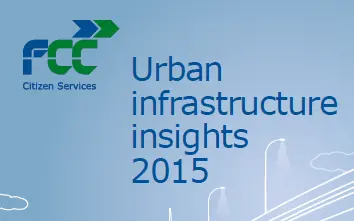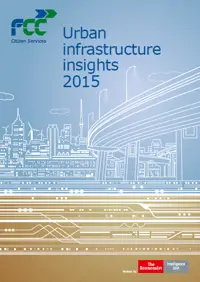28/01/2015
Urban Infrastructure Insights 2015

FCC, the mother company of .A.S.A., sponsored Economist Intelligence Unit report reveals global concerns on provision for future of urban infrastructure and services including waste collection, treatment & recycling. As our company belongs to the most important providers of Citizen Services in the CEE region, we are proud to present the results of the report to our audience.
- Five year crunch point expected for urban infrastructure & services, including waste collection, treatment & recycling unless city leaders take effective action
- Cities need to “engage and educate” citizens about the “hidden-value” infrastructure like waste services
- Greater collaboration between city leaders, citizens and the private sector could improve results for urban services such as waste
Madrid/Himberg, 29 January 2015 - Urban infrastructure and services globally, including waste collection, treatment & recycling, are in need of major investment within the next five years if they are to remain adequate, according to 68% of respondents to a survey by the Economist Intelligence Unit (EIU). Commissioned by FCC (Fomento de Construcciones y Contratas), the Spanish environment, infrastructure and water group, the findings of the survey have been published in a new report entitled “Urban Infrastructure Insights 2015”.
 The study which interviewed over 400 policy makers and business executives across the world assessed the state of global urban infrastructure and services, and how city leaders can engage with citizens and service providers to secure support and investment for these projects. Despite a pressing need for maintenance and upgrades to often ageing services such as waste collection, treatment & recycling and sewers, the research revealed that the value of “hidden infrastructure” is more often only recognised by policy makers.
The study which interviewed over 400 policy makers and business executives across the world assessed the state of global urban infrastructure and services, and how city leaders can engage with citizens and service providers to secure support and investment for these projects. Despite a pressing need for maintenance and upgrades to often ageing services such as waste collection, treatment & recycling and sewers, the research revealed that the value of “hidden infrastructure” is more often only recognised by policy makers.
Brian Gardner, Senior Editor at the EIU, and editor author of the report said: “Cities need to engage and educate their citizens about the broader environmental benefits of investments in recycling, water management, public transportation and other infrastructure activities. Though the environmental value of these endeavours is profound, it is less readily understood by the public and their support is essential.”
When interviewed for the report, Dan Hoornweg, former lead advisor Sustainable Cities to the World Bank, said that it is imperative that city leaders win public support for recycling and better waste management solutions if they want to reduce their environmental impact and vulnerability. He added: “We need to figure out how to run cities with less garbage and less energy”.
PPPs bring money, efficiency and new ideas
In addition to garnering wider support, the challenge of funding projects or services is also critical. Respondents in Western Europe were most likely to cite lack of funding as an impediment to improving infrastructure compared to any other region. The scale of the wider challenge has been highlighted by the American Society of Engineers’ who estimate that the U.S. alone will have to invest US$3.6 trillion to get its urban infrastructure back in shape. One funding mechanism suggested is greater government collaboration with the private sector, through public-private partnerships (PPPs). This was encouraged by 82% of respondents, with it being viewed as a means to deliver more innovative and cost-effective solutions. .A.S.A. has been already aware about benefits of the cooperation projects with the cities. For more than 20 years has built relationships and/or joint-ventures with more than 20 cities in Central and South Eastern Europe. Among others Vienna (AT), Prague (CZ), Bratislava (SK), Trnava (SK), Debrecen (HU), Gyal (HU), Arad (RO), Kikinda (RS) and Sofia (BG).
Building the future
Agustín García Gila, Chairman of FCC´s Environment Area, said “The findings of this report highlight some of the biggest challenges we face in city wide waste management, particularly in terms of galvanising wider support for these services. Demonstrating the value of the service, and improving transparency through data sharing and citizen engagement are absolutely critical for a circular waste economy to flourish.” He also points out how important is for the cities and their partners engage and educate their citizens about the broader environmental benefits of investments in recycling, water management, public transportation and other infrastructure initiatives. “The findings of the report relating to education and demonstrating the value of “hidden” services such as waste are very pertinent. As one of many similar initiatives, last year in Serbia we have introduced an environmental education program to bring our activity closer to children and young people. This program has been already successfully running in Czech Republic, Slovakia and Poland. If we want the support of citizens it is vital that we continue to do this across all age groups, and every urban environment we operate in.”
The recommendations of the report call for city authorities to work together as partners rather than adversaries, build relationships with citizens through feedback platforms, and be honest with citizens and service providers. They also suggest improving efficiency of infrastructure and service delivery through partnerships like PPPs, and planning for the long-term by introducing open source standards, or establishing policies that require new structures meet energy, water and wastewater efficiency goals. By taking this approach city leaders can ensure a long lasting positive legacy for their cities.
For more information:
- .A.S.A. Abfall Service AG
- FCC Communication Department






